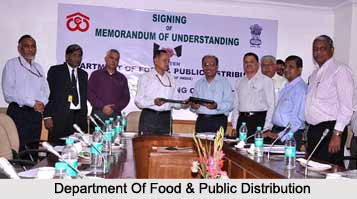 Ministry of Consumer Affairs, Food and Public Distribution is an Indian Government Ministry headed by a minister of Cabinet rank. The ministry is divided into two departments, the Department of Food and Public Distribution and the Department of Consumer Affairs.
Ministry of Consumer Affairs, Food and Public Distribution is an Indian Government Ministry headed by a minister of Cabinet rank. The ministry is divided into two departments, the Department of Food and Public Distribution and the Department of Consumer Affairs.
Department of Consumer Affairs
The Department of Consumer Affairs under Ministry of Consumer Affairs, Food and Public Distribution is responsible for the formulation of policies for Monitoring Prices, availability of essential commodities, Consumer Movement in the country and Controlling of statutory bodies like Bureau of Indian Standards (BIS) and Weights and Measures. Among the major activities that the department oversees are internal trade; inter-state trade; control of Futures Trading: the Forward Contracts (Regulations) Act, 1952 (74 of 1952); the Essential Commodities Act, 1955; prevention of Black-marketing and Maintenance of Supply of Essential Commodities Act, 1980; regulation of packaged commodities; training in Legal Metrology; emblems and names; consumer cooperatives; Forward Markets Commission, Mumbai; monitoring of prices and availability of essential commodities; The Consumer Protection Act, 1986 and Consumer Welfare Fund.
Department of Public Distribution:
The Department is concerned with the formulation of policies concerning the food grains sector - procurement, storage, movement and distribution. It is charged with management of the food economy of the country. It is its responsibility to ensure remunerative rates for our farmers and the supply of food grains at reasonable prices to the consumers through the public distribution system. The Department implements the scheme of minimum support price to the producers of wheat, paddy and coarse grains and the distribution of food grains from the Central Pool. A close watch is kept on the stock and price levels of food grains and efforts are made to ensure their adequate availability at reasonable prices in different parts of the country. Thus in a nutshell the major functions of the Department of Public Distribution are formulation and implementation of national policies on procurement, movement, storage and distribution of wheat, rice and coarse grains; imports and export of wheat, rice and coarse grains; policy and planning for Targetted Public Distribution System (TPDS); buffer stocking policy and matters relating to food security; quality control of wheat, rice and coarse grains procured, stored and distributed by various public agencies in the country; storage facilities for the maintenance of central reserves of wheat, rice and coarse grains; research and dissemination of the techniques of scientific storage of wheat, rice and coarse grains.
The PSUs under the administrative control of Department of Public Distribution are:
* Food Corporation of India (FCI)
* Central Warehousing Corporation (CWC)




















